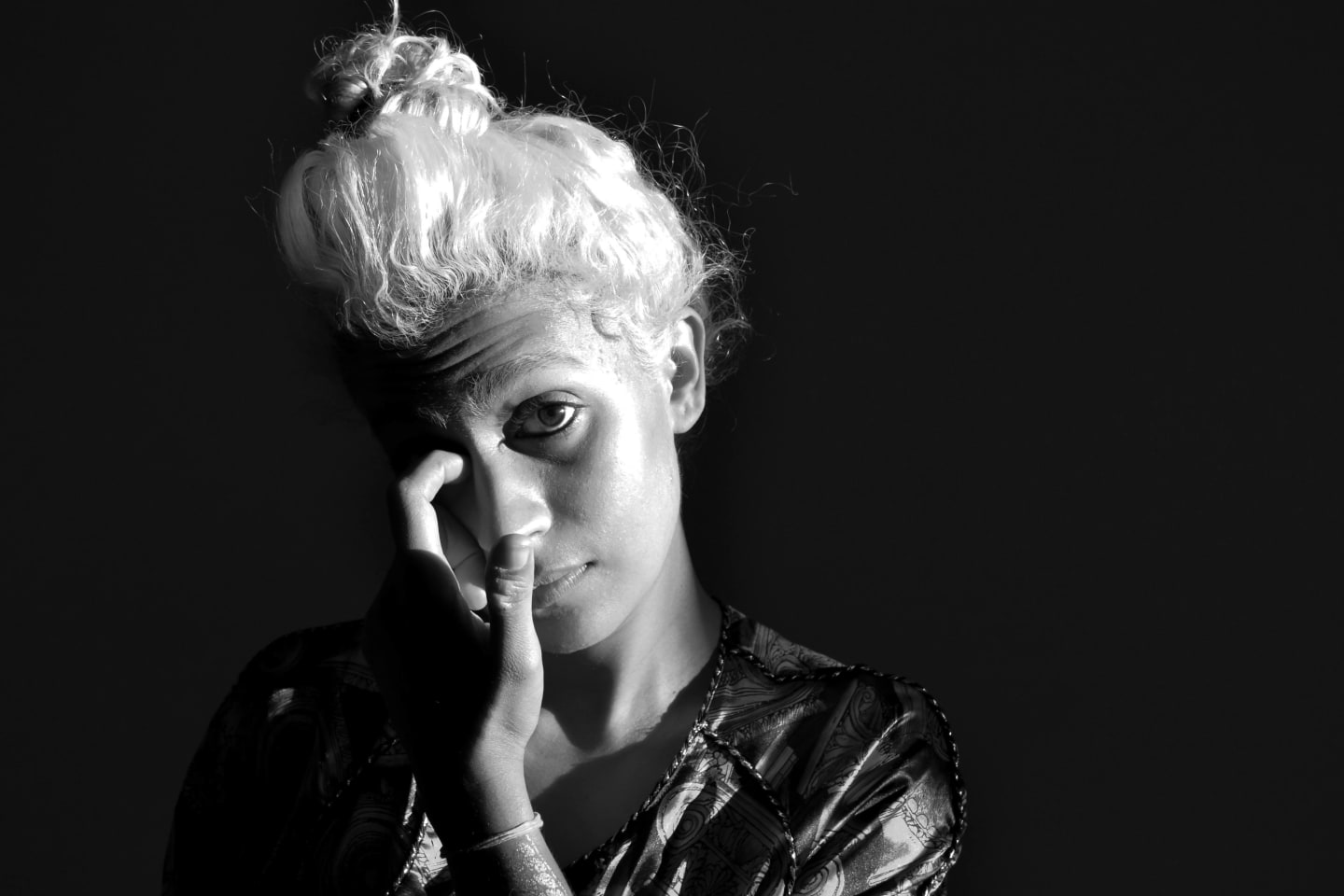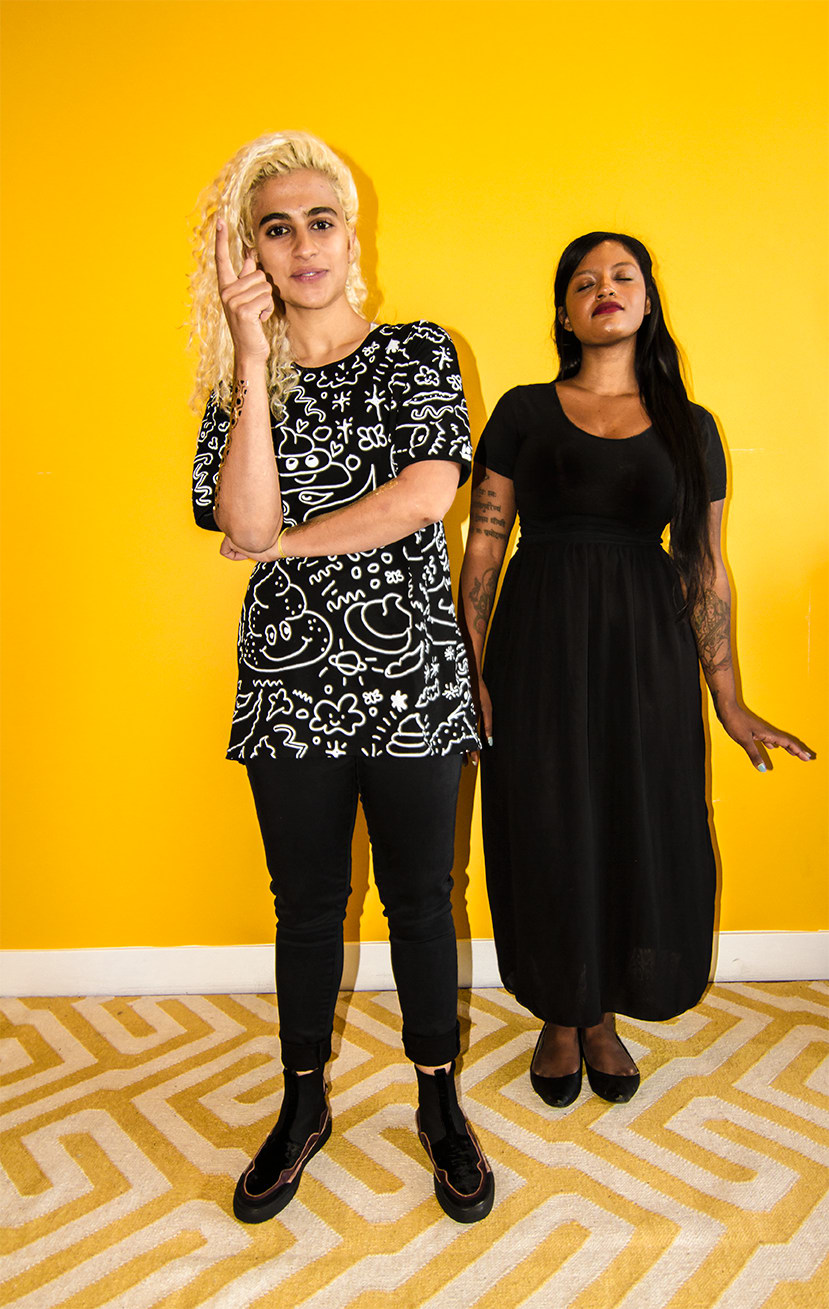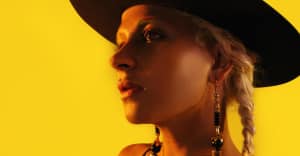Madame Gandhi Is Ready For Women To Lead The World
L.A. activist and artist Kiran Gandhi discusses what “the future is female” really means, why artists need to be business-minded, and her forthcoming debut EP, Voices.
 Photo by Bernard Essiful
Photo by Bernard Essiful
A sonic collage featuring Rosie O'Donnell and Donald Trump talking about periods opens up Los Angeles-based electronic music group Madame Gandhi’s live set. O'Donnell's comments — which she made during a radio interview in August 2015 on the subject of Trump's misogyny — reference Madame Gandhi founder and drummer Kiran Gandhi’s choice to bleed freely during the London Marathon in April 2015. “She’s a radical feminist woman,” says O'Donnell on the sample, moments before the breakdown into the bhangra-infused track. “[She’s] empowering people by going, ‘Fuck you. You don’t like that we have periods? I don’t give a shit.’” Photos from the marathon of Gandhi with a dark red stain on her running pants went viral along with a piece she wrote addressing the decision, which helped spark a global conversation about ending period shame.
Gandhi’s musical and political outlook have co-existed since she was a teen. At a recent panel hosted by feminist collective We Are The XX, she recalled, tongue and cheek, that her decision to play the drums was fueled by the myth that “girls weren’t supposed to play.” However, it wasn’t until 2015 — after having juggled being a Harvard graduate student, a tour drummer for M.I.A, and working behind the scenes in the music industry for Spotify and Interscope Records — that she created Madame Gandhi in Los Angeles with sound designer Alexia Riner. The pair are often joined by other musicians in the studio, but it’s Gandhi drums that are situated at the band’s nucleus, pounding into existence explosive beats.
For Madame Gandhi’s forthcoming debut EP, Voices, Gandhi recruited an all-star cast: vocalist Merrill Garbus of Tune-Yards, guitarist Joe Newman from Alt J., and audio engineer Neil Comber. Alongside bold critiques of patriarchal systems, Gandhi uses Voices as an opportunity to explore more personal aspects of femininity. Over the phone from Los Angeles, she says that a concept she calls “3D femininity” was the inspiration for the whole project. 3D femininity, she tells me, is about allowing women to be more than the dichotomy of dependent or dominant that mainstream stereotypes perpetuate.
One of the EP’s standouts is “Her,” a hazy song held together by brief interludes of Gandhi’s drum solos. The track is about female leadership — an intentional nod to the current election cycle and Gandhi’s open support of Hillary Clinton — and features an eerie voice issuing a warning. If you feel it in the air, then appoint her. The video, which The FADER is premiering below, is inspired by author and environmentalist Margaret Atwood, and explores an alternate universe in which Gandhi asks society to choose a female leader.
Watch the video for “Her,” directed and edited by Wendy Figueroa, below, and read on for an interview with Kiran Gandhi about her upcoming EP, the asymmetrical music industry, and her vision for a female future.
Tell me about your EP.
It’s called Voices, and the idea that we celebrate in this initial body of work is what I call "3D femininity." 3D femininity is the idea that we as women, and as humans, go through a full range of emotions, and we shouldn't suppress these emotions — we should let them live and enjoy them and be vulnerable to them and be sensitive to them because that's something that we're able to do because of who we are.
Biologically women have more hormones — we have access to a larger range of emotions — so why suppress that and see that as something that's bad? Why wouldn't we use that as something that's good? That's pretty epic. Lemonade was such a profound body of work because you see Beyoncé and you see this character in all forms. You see her super powerful and you see her super vulnerable. And unfortunately that's still really rare. We still tell our artists, our girls, and our marketing, "Is she the sweet, dependent, frail type? Or is she the femme fatale dominatrix type?" There's never someone [in the music world] who has the full range of human emotions as we actually do in our day to day.
I want the EP to encourage women to accept that full range of emotions and to really drive in it and say, "I'm so lucky that with each moment of sorrow, I'm going to then experience a moment of joy." Or, "with each moment of fear, I then surpass that and I experience a moment of power." How profound. That's what I want the album to really represent.
How did you come up with the name for your group?
To me, Madame Gandhi is basically female leadership. The only female prime minister of India was Indira Gandhi and she was addressed as Madame Prime Minister or Madame Gandhi. The same way when Hillary will be elected in 2016, we will call her Madame President.
I'm interested in what will it look like to see women in positions of leadership. My mission is to use my voice to make a difference in the world for young women. I do it through my singing, my drumming, my speaking, or through my writing. And that's what the Madame Gandhi music project represents. It's just one of my many avenues to want to work on gender equality.
You talk a lot about representation, and seeing yourself in the media that we consume — seeing your gender, your sexuality, seeing different manifestations of your ethnicity. But I know you're a math student and you deal with business and economics. How do you see those things intersecting?
The music industry has long been dependent on the asymmetry of information in which the business person knows how much money is being made or how much the artist is worth, and the artist doesn't know anything except that hopefully they're paid if their music is good. The reason why that's obviously a huge issue is because, let's say I told you, as the artist, "Oh I'm going to pay you $10,000, aren't you so excited about that? Isn't that great?" But what if you found out that I made a million dollars and of that I pocketed $990,000 and gave you $10,000. That would be very unfair, and that's really how the music industry operated for a long time. Obviously it's told a little bit differently, which is that instead the business fronts the money to the artist, the artist then has to make it back by doing work, but then after when the artist starts making a profit the label pays out the artist from that profit money. The reason that that's obviously so unfair is if you don't know how much money is being made you're very likely to be screwed.
Honestly, there is a feminization of the artist. If you look at the relationship between artist and business person, it's very similar to the relationship between female and male in a traditional marriage construct, whereby the male is empowered to manage the pursestrings, and the female is dependent on those pursestrings and on that financial barrier. If the female doesn't have access to whatever the male decides to give her, she's then vulnerable and doesn't have any other options. Same story in a label and artist relationship: the artist is dependent on the label for money, and then the second the label decides to not do that, the artist is not protected. I think that's why on a very metaphorical level I'm so motivated to want to empower myself with my own financial and business skills.
 Madame Gandhi's Kiran Gandhi and Alexia Riner
Photo by Wendy Figueroa
Madame Gandhi's Kiran Gandhi and Alexia Riner
Photo by Wendy Figueroa
“When I say, ’the future is female,’ it doesn’t mean one gender is superior than the other, it means that we will one day live in a world where we deeply value female energy.”
Women of color aren't really taught to take ownership over our work.
That's it. Because we're not taught to be good at business from a young age, we then assume that we're not good at it.
I really believe that from a young age boys are taught that their value is derived from their skillset and girls' value is derived from their looks. If you're taught from a young age that your main value comes from what you look like, then you're going to spend a disproportionate amount of your day on weight loss, on trying to improve yourself, on trying to look a certain way — and that's really for the sexual consumption of men. That's why it actually really matters and I think that this messaging that women's values are only from their looks prevent them from being their best selves and reaching their fullest potential.
In my music we talk a lot about elevating your voice; don't be afraid. Women are taught to accept a lot of things that are unjust and to just take it because that's part of being in the female body. If someone is asking you to look a certain way and you don't want to, draw that boundary. If someone is making you be quiet about your period but you need to speak up because either you're in pain or you're uncomfortable or you're nauseous, or whatever, speak up about that. You deserve to be comfortable. It's not okay that you're suffering in silence.
You have spent much of your life advocating for women, even outside of your music acts. What does the phrase “the future is female” mean to you?
We live in a world where people say all the time, "Don't be such a pussy." Or, "Don't hit like a girl." "Don't be so girly.” In doing that, what we're explicitly saying is that male qualities are desirable and female qualities are undesirable. And that's the worst thing you can do.
In my mind, "the future is female" means that no longer will female qualities be subordinated to male qualities, and that instead we will live in a world where we recognize that each of us have a mix of biologically female-influenced and biologically male-influenced traits. And how beautiful and how lucky we are to possess both. I want to live in a world where instead of teaching those girls to be more like the boys and hit stronger and run faster, we actually encourage the boys to be more like the girls. Be more caring, be more thoughtful, be more emotionally intelligent, be more specific about your choices.
We have only had 19 female presidents or prime ministers in modern [world] history, and thus we have very little data as to what female leadership even looks like when given space to blossom. I don’t want to live in a society that is destroying itself, I want to live in a society led by someone who will do what is best for her people.
To me, when I say, “the future is female,” it doesn’t mean one gender is superior than the other, it means that we will one day live in a world where we deeply value female energy, where we value the contribution of the female archetype so much so that we need it to survive and thrive as a society. I want to live in a world where we say to anyone, regardless of their gender or lack thereof, “you are girly” as a compliment.
 Photo by Wendy Figueroa
Photo by Wendy Figueroa
Tell me more about your campaign surrounding menstruation stigma.
The stigma is actually a thread that runs through the entire world but it actually manifests itself in these global north and global south countries differently. In the north, what we find are things like tampons are taxed heavily so for women in low-income communities, it's very burdensome to have a period which is actually so offensive (we're taxing someone for their own bodily functions). Secondly we see things like tampons not permitted in public spaces in the same way toilet paper is expected to be provided. Women are not encouraged to ask for a break or whatever they need to take care of themselves on their period because they're not allowed to mention their period at home or at school, it's just like a social cue that's not supposed to be brought up.
The coolest thing specifically about the menstruation issue is that in feminism there's been so many criticisms about it being exclusive — excluding men, excluding black women, excluding lower-income women, excluding young women, excluding non-American women, but with menstruation, this is something that any healthy biologically female in her lifetime is likely to experience. It doesn't matter if you're old, young, black, white, poor — everyone can bond over this. How profound, and then how sad that we've stigmatized this so much that we can't actually talk about this and relay to each other through this. So that's actually the coolest part about the period — it's the forefront issue in a modern feminist agenda because it is intersectional.
Traditional feminist dialogues often exclude transgender women and genderqueer people. I was wondering your thoughts about that?
I do think that a lot of times it's exclusive, [but] I don't think it's intentional. I do think that a lot of changes can be made to make that conversation stronger. At least for me, when I speak about menstrual health and menstrual hygiene, I think I make it clear to say "people who menstruate" as opposed to assuming that it's only women who menstruate.
There has been a lot of discourse on whether or not Hillary Clinton, as a white, upper-class, cis woman can represent all American women. Why do you support Hillary Clinton?
Hillary is extraordinarily equipped to be the President of the United States. She is presidential. She is my candidate of choice not because she is the better choice over Donald Trump, but because she is intelligent and qualified in her own right. Moreover, as a female, she is the only candidate that can ever come close to understanding the experiences that women face that are different from men’s experiences. Change does not happen overnight. We need a woman in the office, someone who can handle the job and who can show the next generation of women and members of other underrepresented communities that leading is possible if you are brave enough.
It is true that she does not have the walk of life of someone from the LGBTQ or person of color community, but I can only hope that she will inspire someone of those backgrounds to run one day and say, “Hillary was amazing, but I bet I can do better!”
